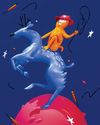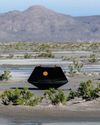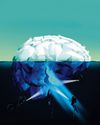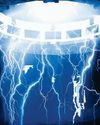
I was recently asked which scientific 'myth' I'd like to see banished from the public consciousness.
Predictably, given the decades I've spent in neuroscience, I had to choose the persistent notion that humans 'only use 10 per cent of our brains'.
We've all heard it, the idea that everything our brains do on a daily basis is handled by just 10 per cent of our grey matter and the rest is... just sitting there, waiting, brimming with untapped potential.
Let's be clear, it's complete nonsense and always has been. Many a scientist has pointed this out but, seemingly, to no avail, as the myth keeps popping up all the time. But here's the thing: it's not just a silly notion, something that leads to eye rolls and shoddy movie plots. It's worse than that. You could even argue that it's actually dangerous.
To begin with, the origins of the myth are unclear. Some contend that it stems from the fact that the
original staining methods that made neurons visible under a microscope for the first time only stained a small percentage of the densely packed-together nerve cells. Another possible origin may be that it was widely believed neurons only made up 10 per cent of our brain cells, with the rest being glia, 'support' cells. More recent studies show this to be a huge oversimplification, if not just flat-out wrong.
It was also assumed that glia were less 'functional' than is the case.
هذه القصة مأخوذة من طبعة June 2023 من BBC Science Focus.
ابدأ النسخة التجريبية المجانية من Magzter GOLD لمدة 7 أيام للوصول إلى آلاف القصص المتميزة المنسقة وأكثر من 9,000 مجلة وصحيفة.
بالفعل مشترك ? تسجيل الدخول
هذه القصة مأخوذة من طبعة June 2023 من BBC Science Focus.
ابدأ النسخة التجريبية المجانية من Magzter GOLD لمدة 7 أيام للوصول إلى آلاف القصص المتميزة المنسقة وأكثر من 9,000 مجلة وصحيفة.
بالفعل مشترك? تسجيل الدخول

Animals have culture like us, but will share theirs with other species
New research suggests that cultural practices in the animal kingdom can develop across species boundaries

Scientists identify a better predictor for heart health than BMI
You want this fat in your steak, but not in your muscles

Asteroid sample reveals life's origin
A 'briny broth' may unlock the secrets of life on Earth... and further afield

DETECTING DEMENTIA
New science is uncovering how Alzheimer's could be detected decades before symptoms strike. Could it give us the head start needed to fight back and defeat the disease?

A dopamine detox does little for your brain chemistry
Swearing off social media may well improve your mood, but probably not because it resets your dopamine levels

Polyphenols: The key to a healthier, longer life or just another health food fad?
A special type of nutrient that's only found in fruit and veg could be more important to your health than vitamins and minerals

The strange daily routines of successful people won't bring you fame and fortune
Punishing 2am workouts and fistfuls of supplements unlikely to help you get ahead in life.

ALL THE LIGHT - WE CAN SEE
New Jersey is the new Roswell – or so it might seem after a swarm of bright lights, glowing orange-red orbs and unidentified flying objects filled the skies throughout December 2024.

HARD TO STOMACH
Despite being a common condition, the cause of irritable bowel syndrome has proven tricky to find. Now researchers are beginning to understand what's going on in our guts... and the best ways to soothe them

How do you treat perimenopause symptoms?
Both hormonal and natural treatments can be used to treat disruptive perimenopause symptoms. But which ones are right for you?